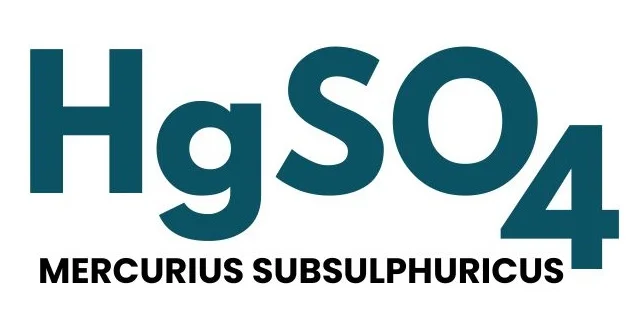Mercurius Sulphuricus, also known as Yellow Sulphate of Mercury or Hydrargyrum oxydatum sub-sulphuricum, is a homeopathic remedy primarily used for gastrointestinal disorders, respiratory ailments, and urinary problems.
It is derived from the combination of mercury and sulfur, and it exhibits specific affinities for conditions involving watery stools, burning sensations, and intense dyspnea.

Table of Contents
ToggleSOURCE INFORMATION
Origin and Historical Facts
- Historically used in traditional medicine for its effects on gastrointestinal disorders and respiratory distress.
- Derived from mercury and sulfur, known for their potent therapeutic actions in homeopathy.
DRUG PATHOGENESIS
- Mercurius Sulphuricus exerts its healing influence primarily on the mucous membranes of the gastrointestinal tract, respiratory system, and urinary organs.
- It is indicated for conditions such as watery stools, burning sensations in the anus, soreness of the tongue tip, edema of the legs, and specific symptoms related to respiratory distress and cardiac weakness.
KEY CHARACTERISTICS
GASTROINTESTINAL SYMPTOMS
- Watery Stools: Diarrhea early in the morning, with stools bursting out in a hot stream of yellow matter.
- Burning in Anus: Burning sensation in the anus accompanying loose stools.
- Sore Tip of Tongue: Tongue tip is sore and sensitive.
URINARY SYMPTOMS
- Scanty, Clear, Scalding Urine: Urine is scanty, clear, and burns during urination.
RESPIRATORY SYMPTOMS
- Intense Dyspnea: Severe difficulty in breathing; patient must sit up.
- Rapid, Short Respiration: Breathing is rapid and shallow.
- Burning in Chest: Sensation of burning pain in the chest.
- Hydrothorax: Accumulation of fluid in the chest cavity (compare with Arsenicum).
CARDIAC SYMPTOMS
- Cardiac Pain and Weakness: Pain in the heart region with general weakness.
MODALITIES
- Worse: Cold and damp weather, early morning.
- Better: Warmth, sitting upright.
WHAT ARE MODALITIES IN HOMOEOPATHY?
RELATIONSHIP WITH OTHER DRUGS
- Compare With: Mercurius aceticus (for cutting pain in urethra during urination).
DOSE
- Form: Typically used in homeopathic potencies.
- Administration: Specific potency and dosage should be determined by a qualified homeopathic practitioner based on individual symptoms and case history.
Frequently Asked Questions (FAQs)
What conditions is Mercurius Sulphuricus used for?
- It is primarily used for watery stools, burning in the anus, sore tongue tip, intense dyspnea, and burning chest pain.
How does Mercurius Sulphuricus affect the respiratory system?
- It causes rapid, shallow breathing with a burning sensation in the chest, indicating its affinity for respiratory distress.
What are the modalities affecting its action?
- Symptoms worsen in cold, damp weather and early morning, while they improve with warmth and sitting upright.
Are there specific symptoms indicating the need for this remedy?
- Yes, symptoms include watery diarrhea, burning anus, sore tongue tip, and intense difficulty in breathing.
Meaning of Difficult Words
- Hydrargyrum oxydatum sub-sulphuricum: This Latin term refers to a chemical combination of mercury (hydrargyrum), oxygen (oxydatum), and sulfur (sub-sulphuricum), indicating the composition of Mercurius Sulphuricus.
- Dyspnea: Severe difficulty in breathing.
- Hydrothorax: Accumulation of fluid in the chest cavity.
- Cardiac: Relating to the heart.
This comprehensive drug picture provides a detailed understanding of Mercurius Sulphuricus, its indications, characteristics, modalities, and relationship with other remedies, making it valuable for both practitioners and individuals seeking homeopathic treatment options.
